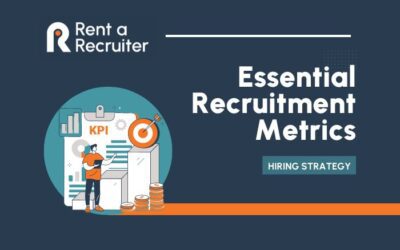In this piece, we cover some of the areas you can look at as a business owner or HR professional to help you build a talent acquisition process that enables you to make great hires.
Top 5 Talent Acquisition Strategies
1. Evidenced-based recruiting
The first talent acquisition strategy recommendation is evidenced-based recruiting. EBR is becoming increasingly common as a way for companies to compete more effectively for talent. It is based on criteria that are most likely to predict successful hiring outcomes and is based on the evidence compiled from research. This evidence is used to determine scientifically which criteria are more likely to predict performance than others. By building a hiring process that incorporates predictive recruiting, companies can see better results in terms of candidates employed.
This is much more rigorous than the traditional approach of relying on imprecise measurements such as ‘gut feelings’ or ‘first impressions.
Designing much better talent acquisition models is difficult. There are no quick fixes and nothing works all the time, but usually, the more scientific methods are significantly more effective.
2. Structured Interviewing
Structured interviewing is an important part of your Talent Acquisition process as it ensures all candidates are competing on a level playing field.
A structured interview is where there is limited informal ‘chat’ during the interview and:
- the same questions are asked of each candidate, in the same order;
- the evaluation criteria for each question are determined beforehand.
The 2 best types of questions are behavioural and situational.
- Behavioural questions focus on a candidate’s past performance in order to predict how the candidate is likely to perform in the future.
- Situational questions present hypothetical situations and ask how the candidate would act in a given situation.
Studies have found that some of the most predictive hiring factors were work samples, cognitive ability tests, and structured interviews. On the other hand, they found that some of the worst predictors of job performance were factors such as age or years of education.
In a case study from the Harvard Business Review, the company structured the interviews around the skills they were looking for and actually gave the candidates the questions beforehand. This hopefully brings out a truer reflection of each candidate rather than simply testing who reacts better under pressure.
For example, to test communication skills they might ask “Teach us about one of your passions, something that you know a lot about or consider yourself to be a nominal expert in — and teach us as if we know nothing about it.”
The 2nd interview is a technical interview to assess their aptitude for the role and their interest in it. It also comprises of a practical part where the applicant works on ‘live’ problem / scenario so you can get an insight into how they might perform in the role.
It was these role -specific questions they asked candidates during this stage technical portion of the interview that lead to an improved retention rate.
As part of our own recruitment process at Rent a Recruiter – we give candidates a sourcing task to assess their ability to find talent and rate their processes or how they went about the task.
3. Skills-based Approach
Talent acquisition strategy number 3 involves moving away from strictly education as a benchmark of success. We are seeing a move from education as a selection criteria towards a more skills-based approach. In the US, the federal government has reduced the use of education requirements in job opportunities citing a weak connection between a person’s formal education and the necessary skills for many jobs.
Job skills becoming obsolete at an alarming rate, so traditional education qualifications don’t retain the value they once did. According to research from Dublin City University, less than a 1/3 of Organisations were confident in their ability to meet their future skill needs.
Technology has been changing employee and customer behaviour rapidly and this has only accelerated due to Covid. Organisations are scrambling to secure talent with the skills to keep pace.
With pre-employment testing platforms, learning management systems and applicant tracking systems, they can:
- Hire talent with the skill sets needed most
- Identify existing skills gaps within the workforce
- Analyse evolving patterns and look for ways to predict future skill needs
- Match employees with training to meet skill needs
- Mobilize and redeploy internal talent effectively
4. Artificial Intelligence
AI is now being deployed more and more effectively in the talent acquisition process. Including AI in your talent acquistion strategy can be hugely benefitical. AI is used to predict how long a job will take to fill based on historical data. Recruiters can also use AI to determine the match between a candidate’s resume and the job occupation and make accurate predictions of future performance based on information about the candidate collected in the job application process.
Chatbots, which are competent in natural language processing, can be deployed during the candidate attraction process to offer them the opportunity to ask questions, which enhances the candidate experience.
Video interviews are now the norm and there are video interview platforms, which use AI-driven assessments using candidates’ laptop or mobile phone cameras to analyse their facial movements, word choice, and speaking voice before ranking them against other applicants based on an automatically generated “employability” score.
5. Drive your Employer Brand
Candidates today want to work for an employer with digitally mature brand , according to a global study by MIT Sloan Management review and Deloitte. LinkedIn suggests that by driving your employer brand – you bring your organisation vision, culture and values to the fore. Today, candidates are more ‘sophisticated shoppers’ and live online – a digital brand is essential to woo talent today. Make sure your EVP (Employee Value Proposition) is visible on job portals. It needs to be easy to find and easily digestible. Share your project wins or company milestones but most importantly today’s talent wants to hear from your employees, ideally by video, talking about their experience working in your business.
In conclusion
Crafting a successful talent acquisition strategy is a dynamic endeavor that requires adaptability and innovation. The top five recommendations outlined above provide a comprehensive framework for organisations seeking to attract and retain top-tier talent in today’s competitive landscape.
As Talent acquisition becomes increasingly complex and competitive, the combination of evidenced-based recruiting, structured interviewing, skills-based approaches, AI integration, and a compelling employer brand forms a holistic strategy. Each recommendation complements the others, creating a robust framework that not only attracts but also retains high-caliber talent. By embracing these strategies, organisations position themselves to thrive in a rapidly changing job market, securing the talent that will drive their continued success. Source: Forbes, Irish Independent, Criteria blog, HR Tech weekly, Deloitte, LinkedIn
For more information on how partnering with our team can help drive your companies growth, contact our team today for a friendly chat.

Barry Prost
Managing Partner
15 years’ experience recruiting senior managers for major international consultants and contractors. Barry is one of the founding directors of Propel. Prior to this, Barry worked for 10 years for Randstad, the 2nd largest recruitment organisation in the world. Managing teams across the UK and Ireland & delivering recruitment solutions to major clients. Barry is a graduate in International Business from Trinity College Dublin. He has a Masters in Business Administration (MBA) from the Smurfit School of Business.
“My favourite food is anything with quinoa”




